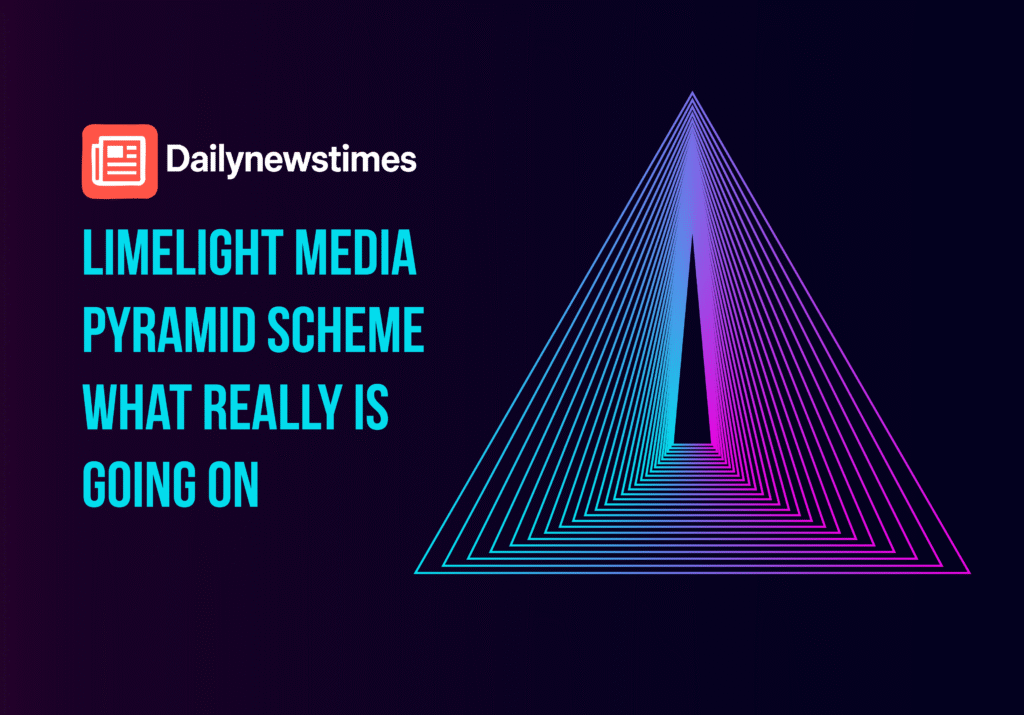You might’ve seen the phrase “Limelight Media pyramid scheme” floating around the internet lately—and honestly, it’s got a lot of people confused. Some think it’s just online drama, others swear they were scammed out of thousands. So what’s the truth? Is Limelight Media a shady business, a misunderstood marketing company, or something in-between?
Let’s dig into what’s really going on, why folks are calling it a pyramid scheme, and what that actually means if you’re a small business owner or someone looking for remote work.
first off what is a pyramid scheme
A pyramid scheme is a type of scam that makes money mostly from recruiting people, not from selling a real product. It promises quick money and high returns, but in reality, only people at the top make profits—while new recruits usually lose their investment. The FTC has a clear definition and warning signs to watch out for.
why people are calling limelight media a pyramid scheme
Limelight Media LLC offers remote sales training programs, mostly advertised through flashy Instagram reels and Facebook ads. They promise you’ll learn to “close high-ticket deals” and potentially earn $10,000+ per month. But after people buy in—sometimes paying $5,000 to $7,500—they start noticing things don’t add up.
- One client posted on BBB that they were charged after canceling and couldn’t reach customer service.
- Another said they got no mentorship, even though it was promised in the package.
- On Facebook, a group of former clients claim they were pressured into upsells and ghosted after paying.
If a company’s main focus is constantly bringing in new people—without delivering solid value—that’s a red flag. And it’s one reason why more folks are using the term Limelight Media pyramid scheme.
is limelight media actually illegal
To be clear, Limelight hasn’t been officially charged by the government (yet). But the behavior described in dozens of complaints does resemble what the FTC classifies as a pyramid scheme: big promises, expensive upfront costs, and a focus on recruitment rather than real services.
There’s also a Reddit thread where someone asked if Limelight’s model could be illegal. While users there disagreed on the legality, they all agreed something felt “off.” You can check the discussion here on Reddit.
complaints from real customers
Here’s a breakdown of the most common complaints from sources like BBB, Sentimeter, and YouTube:
- Unauthorized charges: Some were charged thousands and couldn’t cancel.
- No real mentorship: Clients said they only got prerecorded videos, not live help.
- Fake job promises: Some were told they’d be placed in a remote job after finishing the program—never happened.
- Hard to get refunds: Most say they were denied refunds or couldn’t even get a response.
why does this matter
This kind of stuff isn’t just annoying—it can ruin people’s finances. Think about it: You’re out $7,000, don’t get training, and now you’re in debt or maxed out on a credit card. That’s what happened to a user featured on Sentimeter, who said it took them six months to recover.
The emotional impact’s real too. These programs target people trying to better themselves—students, single parents, or folks between jobs. And when you get scammed, it shakes your confidence.
how limelight media responds
To their credit, Limelight Media has replied to some complaints on BBB, usually claiming “miscommunication” or that customers misunderstood the terms. But most people don’t find these responses reassuring.
One response offered a partial refund—others, just silence.
how to protect yourself
Here’s what you can do if you’re considering a program like this:
- Google the company name + “scam” or “pyramid scheme”
- Look for them on BBB and Trustpilot
- Check if they focus more on recruitment than product or service
- Read the refund policy carefully
- Never pay thousands up front without legal protection
If you already paid, contact your bank or credit card issuer and ask about a chargeback. Also, report shady companies to the FTC and your state attorney general.
conclusion what we really learned here
So is Limelight Media a pyramid scheme? Technically, there’s no official ruling. But based on the patterns—high pressure sales, expensive courses, vague job promises, poor support—it sure acts like one.
Whether or not the law catches up, the lesson here is simple: don’t believe everything that shines in the limelight. If a company wants thousands from you and offers no real guarantee, that’s a problem. And the more people speak out, the less likely others will fall into the same trap.

